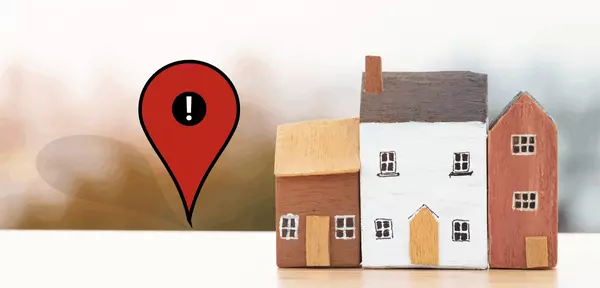
Watch Out for These Neighborhood Red Flags When Buying a Home
When you’re in the market for a new home, it’s important to consider the neighborhood in addition to the property itself. After all, purchasing a home is a big investment and you want to ensure you get a good deal in a safe and desirable area. Aside from the property itself, the neighborhood’s condition can directly affect your home’s value. Here are some red flags to look out for when shopping for a new home in a neighborhood! 1. High Crime Rates If the neighborhood has a higher crime rate than average, it’s a red flag that could indicate a lack of safety or security. Make sure to research the crime rate of the area you’re looking at and consider how it could affect your safety and the value of your home. Another way to check if the area is a safe space to live in is whether or not kids are playing outside during a beautiful day. If you don’t see people walking around or sitting on their front porches, and not even one kid riding their bike, this could mean that these people don’t feel safe outside. Check with the local police department about the crime rate in the neighborhood. 2. Poor School System If the schools are subpar, it could affect the value of your home and the quality of life for your family. Consider researching the school system and deciding if it’s a fit for your family’s needs. If you have kids or planning to have one in the future, this is something that you have to consider. One sign that the local school has a poor school system is a low number of enrollments. The local school might have a reputation for poor management, or perhaps the residents are mostly grown-ups, potentially leading to fewer possible friends and playmates for your kids. 3. Proximity to Amenities When buying a home, check if the location is close to essential amenities. If the neighborhood is lacking basic amenities like grocery stores, banks, and restaurants, it could be a sign that it’s not a desirable area. Aside from current amenities, you should also look up future plans for the area. Plans for new schools, hospitals, public transportation, and other commercial buildings can greatly impact the value of the location. If there are little to no commercial plans, it could mean that development in the area is stagnant. Always consider if the location is convenient for the amenities you need. 4. Noise Levels You might not realize it, but high noise levels can also be a red flag. Excessive noise from traffic, neighbors, or nearby businesses can be a major nuisance to people living within the vicinity. For example, people living near an airport, stadium, or train station can experience excessive noise regularly. While a certain level of noise is okay, you don’t want to live having to wear earplugs on a daily basis. Excessive noise pollution can also cause stress-related illnesses, sleep disruption, hearing loss, and more. It might not be healthy for your family, especially if you have kids, grandparents, or even pets living with you. So before buying a property, consider the noise level in a location. Take a drive around the area at different times of the day to get an idea of the noise level. 5. Property Values Look into the property values in the neighborhood. Are the homes in the area well-maintained or are there many homes in need of repair? Do the homes have similar features and are they similar in size? You can also check market reports online or with your real estate agent to see whether the property values in an area are consistently going up or not. If the homes in the area have lower values, it may be a sign that the neighborhood isn’t a strong investment. When looking for a new home, it’s important to pay attention to the neighborhood and consider the potential red flags. Research the crime rate, school system, amenities, aesthetics, and neighborliness of the area to ensure you’re making the right decision. While you may be in love with the house, it’s important to look beyond the walls and consider the potential risks or red flags a neighborhood may present. Consult your trusted local real estate agent to help you evaluate if the neighborhood is the right fit for you. Never Miss A Thing In Our Pretty Peachy City Subscribe to get fun events delivered to your inbox weekly! Click here to join us!

Pros and Cons of Buying Vacant Land
When it comes to buying vacant land, the opportunities are endless. You can build your dream home as you want it and it can be a great investment, but it also comes with a lot of risks. Before you make the decision to purchase a piece of land, it’s important to weigh the pros and cons. What is vacant land, exactly? A vacant land is an undeveloped piece of real estate that could be the perfect space to build your dream home. It’s more commonly found in rural areas such as off-country roads and can be used for many other purposes such as a farm, storage unit, vacation rental, and other recreational uses. Pros of Buying Vacant Land 1. Flexibility Buying vacant land will give you the freedom and flexibility to build whatever you want on your land. You can build a home, start a business, or just use it for recreational purposes. The sky’s the limit as long as it’s legal and you follow your town’s zoning rules and building rules. This is perfect for anyone who’s looking to build their dream home from scratch as they will be free to create their own design and follow their own preferences. 2. Less competition When buying vacant land, you’ll have less competition compared to buying manufactured homes. Most people nowadays are opting to buy properties that they can move in right away and the competition can be tough. Building a house from scratch is not everyone’s cup of tea, especially since it takes more effort and more time. With the fluctuations of the housing market, buying vacant land is a good choice to avoid strong competition as well as overpaying for a property. 3. Low Maintenance Unlike a home or other property, vacant land requires very little maintenance. When owning a home, maintenance, and repairs can add up to 1%-3% of the purchase price. If you are looking for a low-maintenance investment, buying a vacant land is perfect for you. Vacant land can benefit you if you don’t have the time or resources to take care of a more complex property. 4. Great investment opportunity Buying vacant land is a good investment opportunity. Whether you decide to build something on your land or just wait for its value to appreciate over time, it can be a great way to make a profit if you decide to sell the land in the future, especially if your property is located in an area that’s growing in popularity. Cons of Buying Vacant Land 1. More tedious process Unlike when buying a house, the process of buying vacant land requires more research. You might even experience difficulty in loan approval. For lenders, land is considered a riskier investment than a house. So some lenders will require a better credit score and debt-to-income ratio, and down payments and interest rates may also be higher. In some cases, they might not even provide land loans. Also, boundary dispute is a common problem when buying vacant land. It is a must to always get a land survey to confirm that the surface area listed is the same as what you are actually buying. 2. Fewer options When looking for vacant lands, you might notice that there are fewer options downtown as this area is most likely developed already. With this, you might find more options in rural areas. This is not entirely a problem especially if you are working remotely. But if your office is far from the rural area and if there aren’t enough local amenities to support your lifestyle, buying rural land may not be a good idea for you. 3. Zoning restrictions Depending on your location, different zoning laws dictate how certain pieces of land can be used which could limit your intended purpose for it. Make sure to do your research on the area’s zoning laws. While you’re at it, check the needed permits for building a property and how much they cost. There are several permits that you may need to build a house on undeveloped land so it is best to know them beforehand to allow you to prepare for them and include them in your budget. 4. Time If you are hoping to move into your new home soon, buying land might not be the best option for you. You would need to consider the timeline if you plan on building on your raw land. And even if you already know what type of house you’d like to build, you still need more time to secure permits, find contractors, prep the land, and gain access to install utilities. So if you don’t have a lot of time to spare and can’t put in too much effort for your new property, reevaluate your options. Consult your trusted Real Estate Agent Buying vacant land can be a more challenging task than buying an actual property. It may be a daunting process at first but once you know the right strategy for finding the perfect lot for you, it will all be worth it. The reward will be as much as the effort that you have put into it. If you need any help in real estate investing, feel free to call me at 404.458.8831 or send an email to toi@prettypeachycity.com



